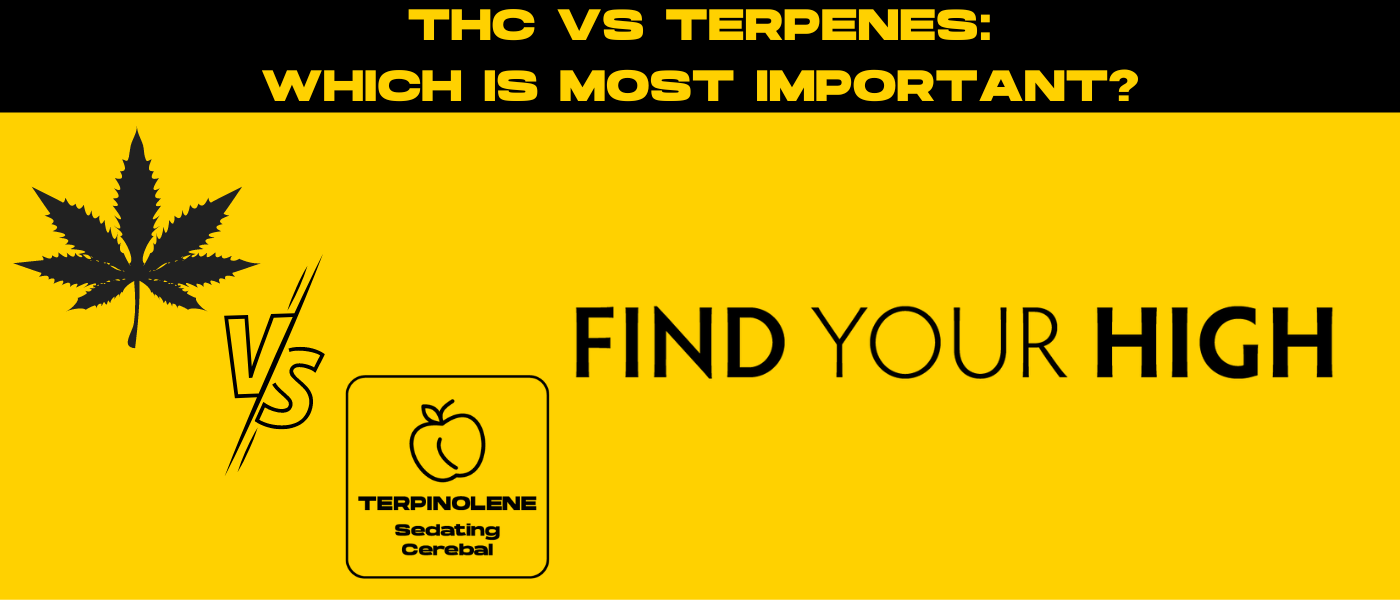What is your #1 priority while searching through our online menu? For some, flavor preference reigns supreme. For others, a high THC percentage is the top determining factor. Many base their decision upon whether or not a strain is indica, sativa, or hybrid — depending on preference. And for some, terpene profiles are the most important. Whatever your priority may be, we encourage you to honor that and make decisions accordingly; however, there’s always room for education.
So many varying factors play a role in determining your cannabis experience. From intrinsic factors such as your personality and cannabis tolerance to extrinsic factors like your environment and choice of smoke circle. Though, very few factors play as important of a role as both THC percentages and terpene profiles. But is one more important than the other?
In this blog, we’re exploring that very question. We’ll discuss what exactly THC is and how it guides your experience before we dive into terpenes and what they do for your high. And finally, we’ll look at the magic that happens when THC and terpenes work together. Let’s begin!
What is THC?
The cannabis plant naturally produces compounds known as cannabinoids, the most popular of which being THC and CBD.
THC, short for tetrahydrocannabinol, is the main psychoactive compound found in the marijuana plant. It works by binding to the cannabinoid receptors in our brain to produce drug-like effects that can impact mood, sleep, pain, memory, and other feelings. Makes total sense since our cannabinoid receptors happen to be concentrated in the areas of our brain associated with thinking, memory, pleasure, coordination, and time perception.
How Does THC Affect Your High?
As we mentioned earlier, many regular consumers solely base their strain choices around high THC percentages. For example, one might choose a strain that boasts 32% THC over one that tests at 28%. But does a high THC percentage really make a difference?
Before we can answer that question, we must touch on the impact that THC has on your high. In general, THC percentage measures how much THC is found in a given strain. For example, if a strain tests at 28%, it means that 28% of the weight of that particular flower is made up of THC. It’s believed that a higher THC percentage often means that the effects of THC are heightened in that particular strain… but what if we told you that isn’t necessarily true?
Though post-consumption testing may indicate a physiologically higher intoxication level, that doesn’t necessarily mean you’re more or less impaired by choosing a higher or lower THC percentage. With that being said, THC is not the only factor that determines your experience. So, what else is there?
What are Terpenes?
If you have yet to read our Terpenes 101 blog, let us catch you up to speed. Terpenes are aromatic compounds found within plants. Terpenes are what give cannabis its unique scent. Different strains often boast different terpene profiles and therefore, different scents. For example, a strain with limonene may come off citrusy while a strain with linalool may come off a bit floral or spicy.
How Do Terpenes Affect Your High?
More than just providing the strain with a specific smell, terpenes are a guiding factor in determining your overall cannabis experience. Terpene molecules are exceptionally small, which gives them the ability to individually bind to those cannabinoid receptors we mentioned earlier. This results in different physiological and psychoactive effects depending on which terpenes make up a specific strain’s terpene profile.
For example, caryophyllene is a terpene found in many popular strains because it’s known to be one of the best terpenes to relieve anxiety. However, Humulene, for example, is known to suppress appetite.
As you can see, different terpenes are beneficial for different reasons, and many strains boast a rich and complex terpene profile that addresses a variety of concerns such as anxiety, appetite, pain, and memory loss — all within a single strain. With that being said, it’s incredibly important to further your terpene knowledge in order to make the best strain choices to address whatever concerns plague you.
However, terpenes cannot work alone, and that’s where THC comes in.
How Do THC and Terpenes Work Together?
Enter: The Entourage Effect.
The entourage effect is commonly spoken of in the cannabis industry because it refers to the connection between the terpenes and cannabinoids (namely, THC). On our website, we share that the entourage effect is ‘the union of terpenes & thc working in concert to create the magic of cannabis’ because when the two most important factors combine, that’s when the real magic happens.
THC alone isn’t enough because psychoactive effects can’t treat specific concerns without a little guidance from terpenes. In contrast, terpenes alone aren’t enough because there’s a reason you’re smoking cannabis, and that reason most likely has to do with the psychoactive effects. Together, THC and terpenes are the perfect combination, working together to better address specific concerns using psychoactive effects.
Final Thoughts…
So back to the original question — thc vs terpenes: Which is more important?
Neither… and both. THC gets you high, but terpenes guide your experience in a direction that you actually want it to go. With that being said, neither is more important than the other because THC and terpenes are not mutually exclusive. Not only can they coexist, but they should coexist in order to provide the best cannabis experience possible.
Next time you’re browsing through hyperwolf.com, preparing to place a weed delivery order, we suggest you take this knowledge to mix things up a bit. Instead of basing your decision solely on THC percentage alone, find which terpenes best suit your needs before identifying strains with ideal terpene profiles. From there, choose terpene-rich strains with varying THC percentages in order to find what works best for you.

 Rewards
Rewards





